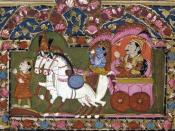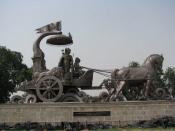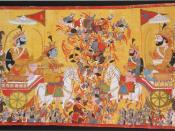In the first chapter of the Bhagavad-Gita the character Arjuna faces a moral dilemma of Duty. The Character Krsna attempts to help Arjuna solve this moral dilemma. Krsna convinces Arjuna to fight in a bloody civil war by using the concepts of Samkhya Wisdom, Karma Yoga and bhakti yoga. In this essay an attempt will be made to prove that Krsna fails to morally justify the war in which he and Arjuna are about to fight. I will examine each concept and show how Krsna's use of these concepts fails to create a moral justification for the battle
Arjuna is a mighty archer riding in a chariot piloted by Krsna. A battle is about to take place which will determine the fate of a nation. Three successive generations of the ruling family have been passed over for the crown for various reasons to a family of close relations. Arjuna's brother is the leader of the army trying to overthrow the current patriarch.
Arjuna's cousin, the reining king, is fighting to hold onto the thrown which was passed down to him through both his father and grand father. Now the two sides of the same family are fighting to see who will rule the nation.
Arjuna questions the morality of a civil war in which he will have to kill friends and family. "Those for whose sake we desire kingdom, enjoyment and pleasures - they stand here in battle, renouncing their lives and riches:" (BG 1:33) "Teachers, fathers, sons, and also grandfathers; uncles and fathers-in-law, grandsons and brothers-in-law, and other kinsmen." (BG 1:34)
The archer then goes on to argue that the spoils to be won from such a battle are not worth the destruction which will need to take place for his army to emerge victorious. Arjuna argues that all...


